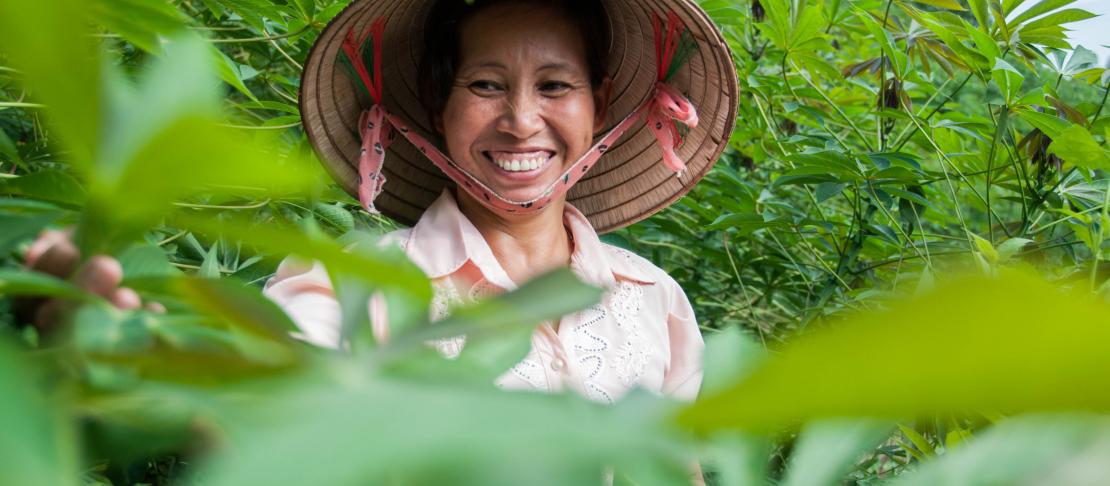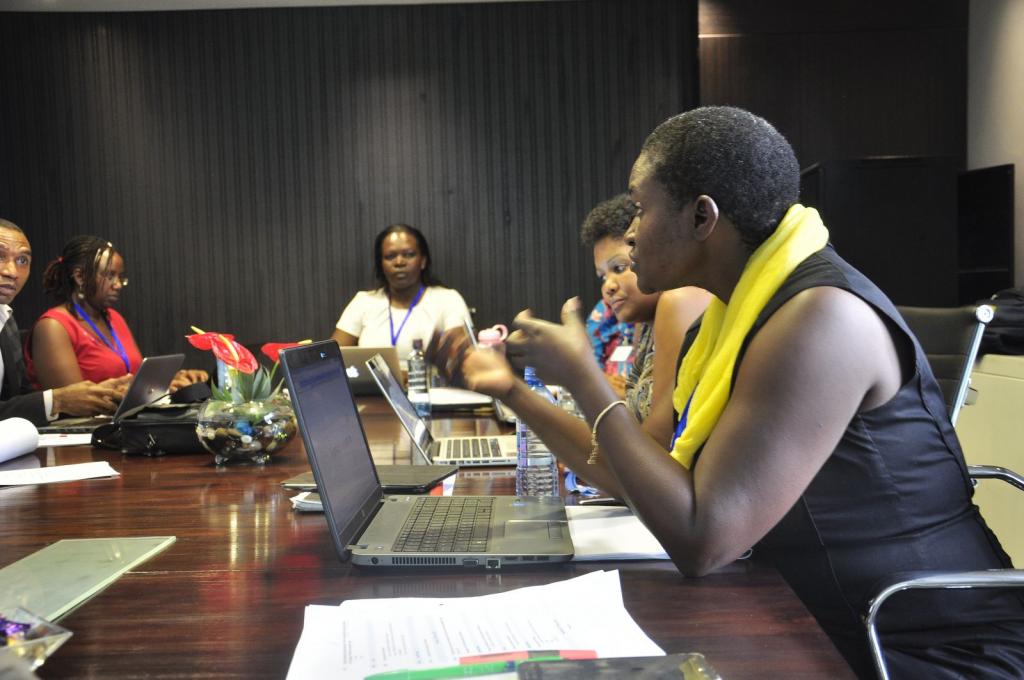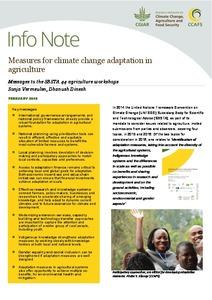Countries call for more action on agriculture ahead of climate negotiations

Agriculture is on the agenda of this year’s climate negotiations. Countries are pushing for measures to improve farmers’ resilience to climate change.
Rigorous scientific assessments are a cornerstone of the United Nations Framework Convention on Climate Change (UNFCCC) negotiation process, but formulating this complex knowledge into workable policy can be daunting. To help bridge this gap, the Subsidiary Body for Scientific and Technological Advice (SBSTA) serves as a forum to provide timely information and advice relating to UNFCCC matters.
SBSTA’s 44th session, currently being held in Bonn, Germany, aims to address two key issues relating to climate change and agriculture. Namely, the identification of key practices and technologies that can sustainably enhance agricultural productivity in the face of climate change, and an assessment of wider policy measures and institutions necessary to enable farmers to adapt. A majority of countries have already expressed the need to prioritize adaptation in agriculture, and the workshop presents an opportunity to showcase best-bet examples that can help put action in motion.
Ahead of the SBSTA workshops, Parties were invited to share their views and experiences, providing an inclusive and transparent mechanism for building a better understanding of the current climate challenges that they each face, as well as examples of what is working in their specific context. Eleven party groupings made submissions, representing countries from Latin America, Southeast Asia, Africa, as well as the United States and European Union (EU).
Knowledge is power
Adapting to climate change is a highly knowledge-intensive process. Common among many of the SBSTA submissions from the tropical regions is the need for improved knowledge for dealing with climate threats. This need is expressed both on the individual farmer level, in terms of gaining knowledge of how to cope with climate change, but also at the expert level, in terms of technology generation and climate information provided through research. Uruguay’s submission calls for further approaches and tools that can help support farmer decision-making processes, such as climate information services, while Vietnam’s submission on behalf of the Association of Southeast Asian Nations (ASEAN) prioritizes the generation of an evidence base regarding the specific benefits of climate-resilient agricultural practices.
For Africa, the challenge of bridging knowledge gaps is dual-pronged. The submission from Mali on behalf of the African Group of Negotiators (AGN) draws attention to the fact that many African farmers are constrained in coping with climate change due to a pervasive lack of knowledge. This is further complicated by a dearth of sufficient technical expertise and scientific data to support informed planning and decision-making relevant to match the contexts of Africa’s diverse agricultural systems, making it difficult to provide proper advice to farmers. Compounding this challenge, adaptation responses will need to be launched at different scales, and suited to match the context and needs of different farming systems. Better knowledge generation and dissemination will be crucial for improved decision-making, suitable to local contexts.

The African Group of Negotiators meets in Nairobi to discuss post-Paris agreements. Photo: S. Kilungu (CCAFS)
One avenue recommended by the AGN group is policy interventions that promote integrating indigenous knowledge with scientific approaches to help get the word out to farmers in an approachable manner, and this approach is supported by CCAFS research. Uruguay’s submission complements this view point, emphasizing the need for a good dialogue between farmers, scientists and policy-makers in the design process for planning agricultural adaptation efforts.
Fruit grows off trees – money doesn’t
The issue of access to finance is a key difficulty expressed by several parties. The most vulnerable farmers are also the most resource constrained, limiting their capacity to adapt. Simultaneously, lack of finance to support research on agriculture and development actions is a major challenge. The Least Developed Country joint submission, spearheaded by the Democratic Republic of Congo, recognizes that the successful uptake of adaptation interventions is often driven by their applicability beyond resilience. For example, if they can meet other human needs, such as improved incomes and food security.
Generally, the countries are optimistic in their submissions, presenting several suggestions to stimulate the flow of funds for further adaptation. Uruguay urges for the establishment of innovative mechanisms that target key value chains—an approach that CCAFS is currently researching via certified supply chains in coffee and cocoa systems in Ghana, Nicaragua, and Peru. While providing incentives for the private sector to invest in adaptation is essential, the ASEAN submission also affirms the importance of financing mechanisms within the UNFCCC process, in channelling the necessary funding to help Parties in implementing and scaling up climate-resilient interventions.
Climate-informed agricultural insurance schemes, also promoted by CCAFS, are identified by several countries as being important for helping smallholder farmers to cope with climate change. Not only can they assuage losses associated with climate variability, they can help farmers escape the poverty trap, by reducing risk and enabling them to take on the necessary investments into improved agricultural practices capable of improving yields and income, while enhancing climate resilience. To improve the effectiveness, coverage and regulation of insurance schemes, the AGN proposes to enhance partnerships between government, insurance companies and farmers. For ASEAN member states, better weather data and infrastructure are needed to properly scale up insurance schemes throughout the region.
CCAFS and CGIAR research is supporting UNFCCC parties
To support the submission process, CCAFS published a set of twinned working papers and info notes targeted at negotiators earlier this year. The working papers provide a catalogue of experiences gathered from across the CGIAR and its partners, exemplifying the latest knowledge on key adaptation measures and practices and technologies. The working papers present a series of entry points for climate adaptation, from local to national policies as well as key interventions within soil management, livestock management and climate information services, and this approach is reflected in the submissions from Uruguay and the AGN.
Several of the parties directly draw upon CCAFS knowledge outputs and case studies in their submissions. The Netherlands’ submission on behalf of EU directly references a CCAFS analysis of Intended Nationally Determined Contribution (INDC) submissions to highlight the growing importance of agricultural climate adaptation among countries across the globe. In addition, the EU stakeholders pinpoint the need to draw upon further research and experience generated from international organizations such as CCAFS to assist countries with achieving the ambitions set out in their INDCs. The FoodAfrica research and development program, supported by several CGIAR centres, is also promoted as a key case study for capacity building through international cooperation.
The submission from the ASEAN member states brings to attention the crucial role of several international and regional actors, including CCAFS. According to the submission, CCAFS and key CGIAR centres bring research expertise which supports the implementation of adaptation measures throughout the region. Stress-tolerant rice cultivars and the innovative technique of alternate wetting and drying of rice, both developed by the International Rice Research Institute (IRRI), are specifically showcased as best-bet practices.
Next steps for the UNFCCC
The need to increasingly build capacity is a common issue shared by many countries. Cooperation and knowledge-sharing within the UNFCCC process, and other networks, is identified as an important tool to draw upon experiences from around the world for this purpose.
Gender equality is also a recurring theme across submissions; analysis of submissions by scientists at CIFOR found that submissions focus on gender responsive strategies which recognize women’s role as agents of change. The differential vulnerabilities of men and women are also being increasingly recognized.
Uruguay urges for the establishment of a global knowledge exchange platform, providing a space for sharing success stories and lessons learned. The country is currently aiming to strengthen its capacity to sustainably manage its native forests, and would benefit heavily from being able to draw on outside experience from other countries that have a stronger tradition in this area. Similarly, Argentina promotes the development of a website cataloguing adaptation actions in each country to allow for replication and knowledge transfer.
existing UNFCCC frameworks can be leveraged to enhance agricultural capacity and promote technology transfer
The ASEAN member states also see the potential for the UNFCCC to play a role in facilitating cooperation and knowledge sharing between parties and observer organizations. Rather than starting from scratch, existing UNFCCC frameworks can be leveraged to enhance agricultural capacity and promote technology transfer. Similarly, in its call for an online knowledge sharing platform, Uruguay recommends establishing synergies with existing initiatives, such as CCAFS.
Overall, Party submissions ahead of the current SBSTA workshops indicate that there is much common ground, presenting the opportunity for collaboration in dealing with issues at the climate-agriculture nexus. The process of building a robust knowledge base of appropriate climate-resilient interventions at the farm-level and beyond continues to be a priority, in order to provide a roadmap for vulnerable countries to manage their climate futures. Linking SBSTA decisions and actions with agriculture in Nationally Determined Contributions (NDCs), which will deliver on the Paris Agreement, will be critical.
Download the working papers and info notes
- Working paper: Adaptation Measures in Agricultural Systems: Messages to the SBSTA 44 Agriculture Workshops
- Info note: Measures for climate change adaptation in agriculture
- Working paper: Agricultural practices and technologies to enhance food security, resilience and productivity in a sustainable manner: Messages to the SBSTA 44 agriculture workshops
- Info note: Climate change adaptation in agriculture: practices and technologies
Further reading
- Blog: Best-bet agricultural practices synthesized ahead of COP22
- Blog: New resource on adaptation measures in agricultural systems for climate negotiators
- Info note: Gender and international climate policy
Snorre Frid-Nielsen is a Research Student Assitant at the CCAFS Coordinating Unit.


